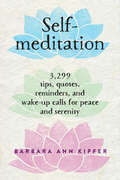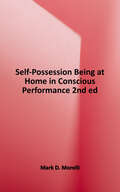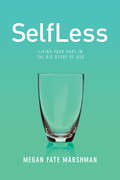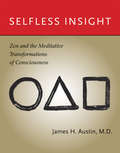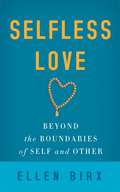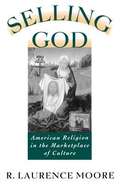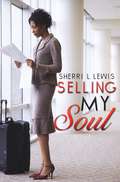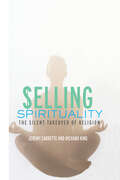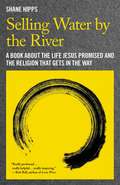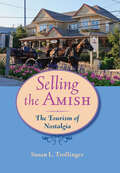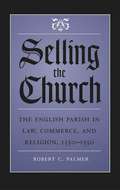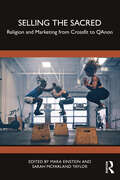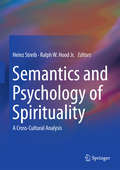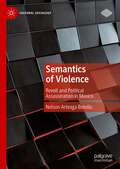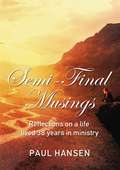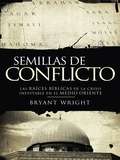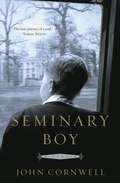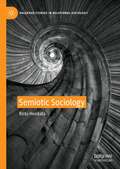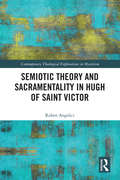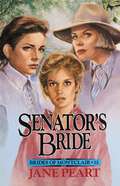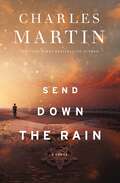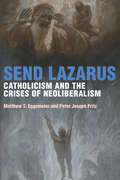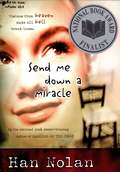- Table View
- List View
Self-meditation: 3,299 Tips, Quotes, Reminders, and Wake-Up Calls for Peace and Serenity
by Barbara Ann KipferDon’t self-medicate—self-meditate. In a book of thousands of entries, written in the abundant, winningly positive way that’s helped her books sell over 1.5 million copies, Barbara Ann Kipfer shows just how we can—and should—meditate anytime, anywhere, and reap the evergrowing list of benefits associated with this practice. <P><P> Created by the author who brought us 14,000 Things to Be Happy About, Instant Karma, 8,789 Words of Wisdom, and The Wish List, SELF MEDITATION is a compulsive, instantly accessible list of hundreds and hundreds of meditation practices that can be done during the course of our daily lives. You don’t need to go to a mountain retreat, renounce meat, or walk through coals on the soles of your feet—here’s a meditation to have with a cup of tea. A waiting-in-line meditation. Meditations while reading, eating, doing sit-ups, working, shopping, or finding yourself stuck in a traffic jam (especially while stuck in a traffic jam). There are breaths to take and praises to give, and throughout, ways to slow down and finally smell the roses—or hear the crickets—or see the stars. <P>Drawn from spiritual practices as varied as Zen, yoga, Sufism, and insight meditation, it’s a delicious spiritual tonic that includes meditation basics, mantras and koans, tips, and more. A completely portable guide, so that at any moment of the day or night, we can all catch our inner breath.
Self-possession: Being at Home in Conscious Performance
by Mark D. MorelliThis book is a meditative exploration of our inescapable and fluid relationship to the fundamental ideals of Meaning, Objectivity, Knowledge, Truth, Reality, and Value upon which we depend to inform and guide our living. It is an attempt to describe the elusive interior experience of these basic notions at work in our conscious performance. It is inspired by the work of Bernard Lonergan, but it is not an account of his ideas. It is an independent exercise in taking possession of oneself as a seeker of meaning and value. “It is as if music and color is washing over the rather austere architecture of INSIGHT, allowing it to do its real work in the life of the reader.” TOM COSGROVE, PROF. OF CIVIL ENGINEERING, U. OF LIMERICK “This book is remarkable in many ways: it is accessible and profound, humorous in a tongue-in-cheek kind of way and serious, very interesting to read in such a way that it is hard to put down, and very fundamental in confronting basic issues of human thinking and living ...” JAMES MARSH, PROFESSOR EMERITUS, PHILOSOPHY, FORDHAM U. "I could not recommend the book more highly. It is an important book." RICHARD LIDDY, SETON HALL U. "This is exactly what the doctor ordered. My thinking is that Catholic universities need to develop a core curriculum of philosophy courses that teach self-appropriation and also link self-appropriation to the skills for discerning the religious or mystical dimension of their own conscious experiences. [Self-Possession] does the former beautifully and provides a splendid intro into the second." Kenneth Melchin, Professor of Theology, St. Paul University. "Morelli's meditations are just the opposite of logic puzzles and trolley problems. [They] are existential lures into the philosophical act itself." Thomas Jeannot, Gonzaga University.
SelfLess: Living Your Part in the Big Story of God
by Megan MarshmanIn SelfLess, popular speaker Megan Fate Marshman exposes the source of self-limiting beliefs that create needless striving to be good enough and points to powerful truths that can transform life into a new experience of freedom, joy, and love. People desire to be significant; however, ironically amidst a self-help and “find-me” culture, they become their own greatest obstacles. Significance cannot be created through self or found by desperately reaching for other people. An abundant life, joyful spirit, and the awe of touching others can only be found by allowing God to fill hearts to overflowing. By moving over and giving Him everything, people discover what they really seek and join the amazing adventure of God’s wondrous story.
Selfless Insight: Zen and the Meditative Transformations of Consciousness
by James H. AustinAttention, self-consciousness, insight, wisdom, emotional maturity: how Zen teachings can illuminate the way our brains function and vice-versa. When neurology researcher James Austin began Zen training, he found that his medical education was inadequate. During the past three decades, he has been at the cutting edge of both Zen and neuroscience, constantly discovering new examples of how these two large fields each illuminate the other. Now, in Selfless Insight, Austin arrives at a fresh synthesis, one that invokes the latest brain research to explain the basis for meditative states and clarifies what Zen awakening implies for our understanding of consciousness. Austin, author of the widely read Zen and the Brain, reminds us why Zen meditation is not only mindfully attentive but evolves to become increasingly selfless and intuitive. Meditators are gradually learning how to replace over-emotionality with calm, clear objective comprehension. In this new book, Austin discusses how meditation trains our attention, reprogramming it toward subtle forms of awareness that are more openly mindful. He explains how our maladaptive notions of self are rooted in interactive brain functions. And he describes how, after the extraordinary, deep states of kensho-satori strike off the roots of the self, a flash of transforming insight-wisdom leads toward ways of living more harmoniously and selflessly. Selfless Insight is the capstone to Austin's journey both as a creative neuroscientist and as a Zen practitioner. His quest has spanned an era of unprecedented progress in brain research and has helped define the exciting new field of contemplative neuroscience.
Selfless Love
by Ellen Jikai BirxSelfless Love shows how meditation can help us realize that we don't love--we are love.Gentle, elegant, and radically inspiring, Selfless Love presents a holistic, experiential meditative path that enables us to see beyond our preconceived notions of identity, spirituality, and humanity. Drawing equally from Zen parables, her experience as a mental health therapist, and the Gospels, Ellen Birx shows us that through meditation we can recognize that our true selves are not selves at all - that all beings are united in unbounded, infinite awareness and love, beyond words. Recognizing the limitations of language in describing the indescribable, Birx concludes each chapter in the Zen tradition of "turning words" with a verse meant to invite insights.
Selling God: American Religion in the Marketplace of Culture
by R. Laurence Moore[Back Cover] "Religion in America is up for sale. The products range from a plethora of merchandise in questionable taste--such as Bible-based diet books (More of Jesus. Less of Me), Rapture T-shirts (one features a basketball game with half its players disappearing in the Rapture--the caption is "Fast Break"), and bumper stickers and frisbees with inspirational messages--to the unabashed consumerism of Jim Bakker's Heritage USA, a grandiose Christian theme park with giant water slide, shopping mall, and office complex. We tend to think of these phenomena--which also include a long line of multimillionaire televangelists and the almost manic promotion of Christmas giving--as a fairly recent development. But as R. Laurence Moore points out in Selling God, religion has been deeply involved in our commercial culture since the beginning of the nineteenth century. In a sweeping, colorful history that spans over two centuries of American culture, Moore examines the role of religion in the marketplace, revealing how religious leaders have borrowed (and invented) commercial practices to promote religion--and how business leaders have borrowed (and invented) religion to promote commerce. It is a book peopled by a fascinating roster of American originals, including showman P.T. Barnum and painter Frederick Church, film directors D.W. Griffith and evangelist Norman Vincent Peale. Ranging from the rise of gymnasiums and "muscular Christianity," to L. Ron Hubbard's Church of Scientology, Selling God provides both fascinating social history and an insightful look at religion in America."
Selling My Soul
by Sherri L. LewisSex scandal rocks megachurch!Returning from a two-year mission trip in Mozambique, Trina Michaels plans to ignore the sensational headline that screams from the front page of the Washington Times. Her heart is still in Africa, the place that feels more like home than anywhere she's ever lived--and the place where the love of her life still is. Her dream of a quick return to Mozambique fades within hours when Trina discovers that her mother has been diagnosed with cancer. The cost of treatment is expensive, and Trina is forced to return to her career in public relations to pay for it.She is assigned a damage control client--the bishop whose church made headline news when an associate pastor and deacon were accused of sexually abusing young boys. To complicate matters, the young boys are now men, and one of them is married to Trina's best friend. Representing Bishop Walker could cost Trina her most valued friendship, her reputation, and a future with her new love. As she plows deeper into the scandal and the bishop blackmails her to cover the church's secrets and lies, Trina realizes it could cost her soul.
Selling My Soul
by Sherri L. LewisSex scandal rocks megachurch!Returning from a two-year mission trip in Mozambique, Trina Michaels plans to ignore the sensational headline that screams from the front page of the Washington Times. Her heart is still in Africa, the place that feels more like home than anywhere she's ever lived—and the place where the love of her life still is. Her dream of a quick return to Mozambique fades within hours when Trina discovers that her mother has been diagnosed with cancer. The cost of treatment is expensive, and Trina is forced to return to her career in public relations to pay for it.She is assigned a damage control client—the bishop whose church made headline news when an associate pastor and deacon were accused of sexually abusing young boys. To complicate matters, the young boys are now men, and one of them is married to Trina's best friend. Representing Bishop Walker could cost Trina her most valued friendship, her reputation, and a future with her new love. As she plows deeper into the scandal and the bishop blackmails her to cover the church's secrets and lies, Trina realizes it could cost her soul.
Selling Spirituality: The Silent Takeover of Religion
by Richard King Jeremy CarretteFrom Feng Shui to holistic medicine, from aromatherapy candles to yoga weekends, spirituality is big business. It promises to soothe away the angst of modern living and to offer an antidote to shallow materialism. Selling Spirituality is a short, sharp, attack on this fallacy. It shows how spirituality has in fact become a powerful commodity in the global marketplace - a cultural addiction that reflects orthodox politics, curbs self-expression and colonizes Eastern beliefs.Exposing how spirituality has today come to embody the privatization of religion in the modern West, Jeremy Carrette and Richard King reveal the people and brands who profit from this corporate hijack, and explore how spirituality can be reclaimed as a means of resistance to capitalism and its deceptions.
Selling Water by the River: A Book about the Life Jesus Promised and the Religion That Gets in the Way
by Shane HippsWork, sex, ice cream, religion-they all promise fulfillment. But what they deliver is fleeting.Jesus knew about this quest. He came to show us that peace is possible in this life, not just the next one. Yet Christianity, the very religion that claims Jesus as its own, has often built the biggest barriers to him and the life he promised. Celebrated speaker and pastor Shane Hipps revives the faith with a fresh and persuasive understanding of the message of Jesus. The shocking truth is that Jesus proclaimed "eternal life" as a present reality that dwells within each of us. A transformative breakthrough, this book goes beyond "religion" or "spirituality" and cuts to the heart of our humanity and existence. It's about realizing that we already possess what we are searching for, and that the Heaven we long for isn't just a gift when we die, but a gift while we live. possible in this life, not just the next one. Yet Christianity, the very religion that claims Jesus as its own, has often built the biggest barriers to him and the life he promised. Celebrated speaker and pastor Shane Hipps revives the faith with a fresh and persuasive understanding of the message of Jesus. The shocking truth is that Jesus proclaimed "eternal life" as a present reality that dwells within each of us. A transformative breakthrough, this book goes beyond "religion" or "spirituality" and cuts to the heart of our humanity and existence. It's about realizing that we already possess what we are searching for, and that the Heaven we long for isn't just a gift when we die, but a gift while we live.
Selling the Amish: The Tourism of Nostalgia (Young Center Books in Anabaptist and Pietist Studies)
by Susan L. TrollingerMore than 19 million tourists flock to Amish Country each year, drawn by the opportunity to glimpse "a better time" and the quaint beauty of picturesque farmland and handcrafted quilts. What they may find, however, are elaborately themed town centers, outlet malls, or even a water park. Susan L. Trollinger explores this puzzling incongruity, showing that Amish tourism is anything but plain and simple.Selling the Amish takes readers on a virtual tour of three such tourist destinations in Ohio’s Amish Country, the world’s largest Amish settlement. Trollinger examines the visual rhetoric of these uniquely themed places—their architecture, interior decor, even their merchandise and souvenirs—and explains how these features create a setting and a story that brings tourists back year after year.This compelling story is, Trollinger argues, in part legitimized by the Amish themselves. To Americans faced with anxieties about modern life, being near the Amish way of life is comforting. The Amish seem to have escaped the rush of contemporary life, the confusion of gender relations, and the loss of ethnic heritage. While the Amish way supports the idealized experience of these tourist destinations, it also raises powerful questions. Tourists may want a life uncomplicated by technology, but would they be willing to drive around in horse-drawn buggies in order to achieve it?Trollinger's answers to important questions in her fascinating study of Amish Country tourism are sure to challenge readers’ understanding of this surprising cultural phenomenon.
Selling the Church
by Robert C. PalmerIn the years of expanding state authority following the Black Death, English common law permitted the leasing of parishes by their rectors and vicars, who then pursued interests elsewhere and left the parish in the control of lay lessees. But a series of statutes enacted by Henry VIII between 1529 and 1540 effectively reduced such clerical absenteeism. Robert Palmer examines this transformation of the English parish and argues that it was an important part of the English Reformation.Palmer analyzes an extensive set of data drawn from common law records to reveal a vigorous and effective effort by the laity to enforce the new statutes. Motivated by both economic and traditional ideals, the litigants made the commercial activities of leaseholding and buying for resale and profit the exclusive domain of the laity and acquired the power to regulate the clergy. According to Palmer, these parish-level reformations presaged and complemented other initiatives of the crown that have long been considered central to the reign of Henry VIII.
Selling the Sacred: Religion and Marketing from Crossfit to QAnon
by Mara Einstein Sarah McFarland TaylorThere’s religion in my marketing! There’s marketing in my religion! Selling the Sacred explores the religio-cultural and media implications of a two-sided phenomenon: marketing religion as a product and marketing products as religion. What do various forms of religion/marketing collaboration look like in the twenty-first century, and what does this tell us about American culture and society?Social and technological changes rapidly and continuously reframe religious and marketing landscapes. Crossfit is a “cult.” Televangelists use psychographics and data marketing. QAnon is a religion and big business. These are some of the examples highlighted in this collection, which engages themes related to capitalist narratives, issues related to gender and race, and the intersection of religion, politics, and marketing, among other key issues.The innovative contributors examine the phenomenon of selling the sacred, providing a better understanding of how marketing tactics, married with religious content, influence our thinking and everyday lives. These scholars bring to light how political, economic, and ideological agendas infuse the construction and presentation of the “sacred,” via more traditional religious institutions or consumer-product marketing. By examining religion and marketing broadly, this book offers engaging tools to recognize and unpack what gets sold as “sacred,” what’s at stake, and the consequences.A go-to resource for those working in marketing studies, religious studies, and media studies, Selling the Sacred is also a must-read for religious and marketing professionals.
Semantics and Psychology of Spirituality
by Jr. Heinz Streib Ralph W. HoodThis book examines what people mean when they say they are "spiritual". It looks at the semantics of "spirituality", the visibility of reasons for "spiritual" preference in biographies, in psychological dispositions, in cultural differences between Germany and the US, and in gender differences. It also examines the kind of biographical consequences that are associated with "spirituality". The book reports the results of an online-questionnaire filled out by 773 respondents in Germany and 1113 in the US, personal interviews with a selected group of more than 100 persons, and an experiment. Based on the data collected, it reports results that are relevant for a number of scientific and practical disciplines. It makes a contribution to the semantics of everyday religious language and to the cross-cultural study of religion and to many related fields as well, because "spirituality" is evaluated in relation to personality, mysticism, well-being, religious styles, generativity, attachment, biography and atheism. The book draws attention to the - new and ever changing - ways in which people give names to their ultimate concern and symbolize their experiences of transcendence.
Semantics of Violence: Revolt and Political Assassination in Mexico (Cultural Sociology)
by Nelson Arteaga BotelloThis book describes three impactful cases of political violence that broke out in Mexico in 1994, pointing to an important juncture in Mexican political development. At that point, the patrimonial order centered on the PRI and the Mexican presidency entered a momentous crisis that is still ongoing after a quarter of a century and caused the patrimonial order and the civil order to compete over Mexican public life. Such competition, in turn, unfolds at the cultural level on the terrain of three semantics of political violence that shape public debates over violence in Mexico. Ultimately, this book sheds light over the refraction of patrimonial and civil attributions across such cultural terrains.
Semi-Final Musings: Reflections on a life lived 38 years in ministry
by Paul HansenThe target audience for this volume is ministry leaders, Pastors, elders and deacons, as well as those individuals who would like to grow in their relationship with Jesus Christ. The audience will be of necessity: men and women who are either in College or Seminary and/or in ministries working in churches.
Semillas de conflicto
by Bryant WrightUn claro y profundo análisis bíblico del origen, la historia y la importancia del conflicto de Medio Oriente.El actual conflicto en el Medio Oriente comenzó mucho tiempo antes de la creación del Estado de Israel en 1948: se originó cuando Abraham pecó y torció la promesa de Dios de que él y sus herederos construirían una gran nación y heredarían el territorio hoy llamado la «tierra prometida».Semillas de conflicto, un relato histórico y político, ofrece una explicación clara de la historia bíblica de Abraham, Sara y Agar y de la consiguiente rivalidad fraternal entre Jacob y Esaú, cuyas decisiones dieron origen a las tres religiones más influyentes del mundo: el judaísmo, el cristianismo y el islamismo.Este fascinante análisis sobre los inicios del conflicto también explica la razón por la que este territorio es tan importante en nuestros días. Además, Wright echa luz sobre las incompatibles perspectivas cristiana, judía e islámica sobre el conflicto y responde a la pregunta ¿Dios tiene favoritismos?
Seminary Boy
by John CornwellOne of the most extraordinary memoirs of recent years, the acclaimed writer John Cornwell has finally written his own story, and the story of a choice he had to make between the Church and a life lived outside its confines. John Cornwell decided to become a priest at the age of thirteen, a strange choice perhaps for a boy who'd been sent to a 'convalescent home' for having whacked a nun about the head. Growing up in a chaotic household, sharing two rooms with his brothers and sisters, his hot-headed mother and - when he was around - absconding father, John spent his time roaming the war-torn streets of London looking for trouble. One day, at his mother's suggestion, he responded to a call from his local parish priest for altar servers. The 'dance of the rituals', the murmur of Latin and the candlelit dawn took hold of his imagination and provided him with a new and unexpected comfort. He left post-war London for Cotton, a seminary in the West Midlands. In this hidden, all-male world, with its rhythms of devotion and prayer, John grew up caught between his religious feelings and the rough and tumble of his life back in London; between seeking the face of God in the wild countryside around him and experiencing his first kiss; between monitoring his soul and watching a girl from a moving train whose face he will never forget. Cornwell tells us of a world now vanished: of the colourful community of priests in charge; of the boys and their intense and sometimes passionate friendships; of the hovering threat of abuse in this cloistered environment. And he tells us of his struggle to come to terms with a shameful secret from his London childhood - a vicious sexual attack which haunts his time at Cotton. A book of tremendous warmth and humour, 'Seminary Boy' is about an adolescent's search for a father and for a home.
Semiotic Sociology (Palgrave Studies in Relational Sociology)
by Risto HeiskalaSemiotic Sociology provides solid ground for cultural analysis in the social sciences by building up a mediation between structuralist semiology (Saussure), pragmatist semiotics (Peirce), and phenomenological sociology (Schutz, Garfinkel, Berger and Luckmann). This is a deviation from the common view that these traditions are seen as mutually exclusive alternatives and thus competitors of each other. The net result of the synthesis is that a new social theory emerges wherein action theories (Weber and rational choice) are based on phenomenological sociology and phenomenological sociology is based on neostructuralist semiotics, which is a synthesis of the Saussurean and the Peircean traditions of understanding habits of interpretation and interaction. The core issues of social research are then addressed on these grounds. The topics covered include the economy/society relationship, power, gender, modernity, institutionalization, the canon of current social theory including micro/macro and agency/structure relations, and the grounds of social criticism.
Semiotic Theory and Sacramentality in Hugh of Saint Victor (Contemporary Theological Explorations in Mysticism)
by Ruben AngeliciThis book offers Hugh of Saint Victor’s early scholastic thoughts on sacrament in order to re-discover the pre-modern theological understanding of ontological signification. The Christian understanding of sacrament through the category of ‘signs’ results in a theology that inherently shares in the philosophical notion of semiotics. Yet, through the advent of post-structuralism, current sign-theory is effectively shaped by post-Kantian, ontological foundations. This can lead to misinterpretations of the sacramental theology that predates this intellectual turn. The book works within a context of Christological, realist mysticism. Such an approach allows mutually informing debates in semiotic development and studies on sacramental theology to sit side-by-side. In addition, as a work of ressourcement, influenced by the methodology and concerns of the historical, French Ressourcement, this study seeks to continue an engagement with some of the most promising sacramental positions that have emerged throughout twentieth-century theology, particularly with the revival of interest in Victorine theology. By providing an examination of sacramentality and theories of signification in the early scholastic theology of Hugh of Saint Victor, this book gives fresh impetus to the theology surrounding sacrament. As such, it will be of great interest to scholars of mysticism, theologians of sacrament, philosophical theologians, and philosophers of religion.
Senator's Bride (Brides of Montclair #12)
by Jane Peart"Have you any plans for the rest of the day?" he asked. "Plans?" she echoed. "Whatever they were, cancel them." He grinned. Crystal nodded, dazed, knowing somehow that if he had proposed a trip to Mars she would have been helpless to refuse. She had come to Virginia to work, not to fall in love -- certainly not with someone like Kip Montrose. Both Kip and his ancestral mansion, Montclair, had captured her imagination. The history of the house intrigued her as much as its master. Even ten years after the end of WWI, the families of Mayfield, VA, still feel its destructive effects. With his days as a dare-devil flying ace behind him, Kip Montrose is having a hard time settling down in the small Southern town and finding a new direction for his life. At the same time, the twins, Cara and Kitty Cameron, are also trying to rebuild their lives shadowed by loss. Then, the arrival of Crystal Kirk, an attractive young career woman, to rent Eden Cottage, and the return of Garnet with Bryane, and her English companion, Jill, sparks excitement, romance, as well as unexpected problems. The era of the Roaring Twenties brings new challenges to the younger members of the Montrose and Cameron clans, as they search for new purpose for their lives, face their inherited destiny, and hope for lasting love. Suddenly, a senatorial campaign tears the families apart and plunges old friends into a bitter political battle in which both winners and losers attain unexpected results.
Send Down the Rain: New from the author of The Mountains Between Us and the New York Times bestseller Where the River Ends
by Charles MartinFrom the New York Times bestselling author of The Mountain Between Us comes a new, spellbinding story of buried secrets, lost love, and the promise of second chances.Allie is still recovering from the loss of her family’s beloved waterfront restaurant on Florida’s Gulf Coast when she loses her second husband to a terrifying highway accident. Devastated and losing hope, she shudders to contemplate the future—until a cherished person from her past returns.Joseph has been adrift for many years, wounded in both body and spirit and unable to come to terms with the trauma of his Vietnam War experiences. Just as he resolves to abandon his search for peace and live alone at a remote cabin in the Carolina mountains, he discovers a mother and her two small children lost in the forest. A man of character and strength, he instinctively steps in to help them get back to their home in Florida. There he will return to his own hometown—and witness the accident that launches a bittersweet reunion with his childhood sweetheart, Allie.When Joseph offers to help Allie rebuild her restaurant, it seems the flame may reignite—until a 45-year-old secret from the past begins to emerge, threatening to destroy all hope for their second chance at love.In Send Down the Rain, Charles Martin proves himself to be a storyteller of great wisdom and compassion who bears witness to the dreams we cherish, the struggles we face, and the courage we must summon when life seems to threaten what we hold most dear.
Send Lazarus: Catholicism and the Crises of Neoliberalism (Catholic Practice in North America)
by Matthew T. Eggemeier Peter Joseph FritzToday’s regnant global economic and cultural system, neoliberal capitalism, demands that life be led as a series of sacrifices to the market. Send Lazarus’s theological critique wends its way through four neoliberal crises: environmental destruction, slum proliferation, mass incarceration, and mass deportation, all while plumbing the sacrificial and racist depths of neoliberalism.
Send Me Down a Miracle
by Han NolanA sleepy, God-fearing community in Alabama erupts in chaos when a flamboyant artist from New York City returns to her hometown for an artistic experiment. "A fresh voice and an enigmatic subject combine to make kids engage in an activity they probably don't do much-contemplate."-Booklist
Send Me Your Guardian Angel: Padre Pio
by Alessio ParenteFor those who have faith this book will make it stronger, for those who don't it will set them wondering.
